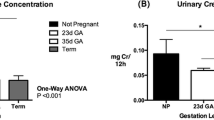Abstract
We have previously reported that maternal creatine supplementation protects the neonate from hypoxic injury. Here, we investigated whether maternal creatine supplementation altered expression of the creatine synthesis enzymes (arginine:glycine amidinotransferase [AGAT], guanidinoaceteate methyltransferase [GAMT]) and the creatine transporter (solute carrier family 6 [neurotransmitter transporter, creatine] member 8: SLC6A8) in the term offspring. Pregnant spiny mice were fed a 5% creatine monohydrate diet from midgestation (day 20) to term (39 days). Placentas and neonatal kidney, liver, heart, and brain collected at 24 hours of age underwent quantitative polymerase chain reaction and Western blot analysis. Maternal creatine had no effect on the expression of AGAT and GAMT in neonatal kidney and liver, but mRNA expression of AGAT in brain tissues was significantly decreased in both male and female neonates born to mothers who were fed the creatine diet. SLC6A8 expression was not affected by maternal dietary creatine loading in any tissues. Maternal dietary creatine supplementation from midgestation in the spiny mouse did not alter the capacity for creatine synthesis or transport.
Similar content being viewed by others
References
Wallimann T, Tokarska-Schlattner M, Schlattner U. The creatine kinase system and pleiotropic effects of creatine. Amino Acids. 2011;40(5):1271–1296.
Walker JB. Creatine: biosynthesis, regulation, and function. Adv Enzymol Relat Areas Mol Biol. 1979;50:177–242.
Brosnan JT, Brosnan ME. Creatine: endogenous metabolite, dietary, and therapeutic supplement. Annu Rev Nutr. 2007;27: 241–261.
Braissant O, Henry H, Villard AM, Speer O, Wallimann T, Bachmann C. Creatine synthesis and transport during rat embryogenesis: spatiotemporal expression of AGAT, GAMT and CT1. BMC Dev Biol. 2005;5:9.
Ireland Z, Russell AP, Wallimann T, Walker DW, Snow R. Developmental changes in the expression of creatine synthesizing enzymes and creatine transporter in a precocial rodent, the spiny mouse. BMC Dev Biol. 2009;9:39.
Cannata DJ, Ireland Z, Dickinson H, et al. Maternal creatine supplementation from mid-pregnancy protects the diaphragm of the newborn spiny mouse from intrapartum hypoxia-induced damage. Pediatr Res. 2010;68(5):393–398.
Ireland Z, Castillo-Melendez M, Dickinson H, Snow R, Walker DW. A maternal diet supplemented with creatine from mid-pregnancy protects the newborn spiny mouse brain from birth hypoxia. Neuroscience. 2011;194:372–379.
Ellery SJ, Ireland ZJ, Kett MM, Snow R, Walker DW, Dickinson H. Creatine pretreatment prevents birth asphyxia-induced injury of the newborn spiny mouse kidney [published online ahead of print November 22, 2012]. Pediatr Res. doi:10.1038/pr.2012. 174.
Ireland Z, Dickinson H, Snow R, Walker DW. Maternal creatine: does it reach the fetus and improve survival after an acute hypoxic episode in the spiny mouse (Acomys cahirinus)? Am J Obstet Gynecol. 2008;198(4):431 e1–e6.
Derave W, Marescau B, Vanden Eede E, Eijnde BO, De Deyn PP, Hespel P. Plasma guanidino compounds are altered by oral creatine supplementation in healthy humans. J Appl Physiol. 2004; 97(3):852–857.
Fitch CD, Hsu C, Dinning JS. Some factors affecting kidney transamidinase activity in rats. J Biol Chem. 1960;235:2362–2364.
McKenna MJ, Morton J, Selig SE, Snow RJ. Creatine supplementation increases muscle total creatine but not maximal intermittent exercise performance. J Appl Physiol. 1999;87(6):2244–2252.
Guthmiller P, Van Pilsum JF, Boen JR, McGuire DM. Cloning and sequencing of rat kidney L-arginine: glycine amidinotransferase. Studies on the mechanism of regulation by growth hormone and creatine. J Biol Chem. 1994;269(26):17556–17560.
Dickinson H, Walker DW. Managing a colony of spiny mice (Acomys cahirinus) for perinatal research. Australian and New Zealand Council for the Care of Animals in Research and Training (ANZCCART) News 2007;20:4–11.
Wyss M, Kaddurah-Daouk R. Creatine and creatinine metabolism. Physiol Rev. 2000;80(3):1107–1213.
Miller RK, Davis BM, Brent RL, Koszalka TR. Transport of creatine in the human placenta. The Pharmacologist. 1974;16(2):305.
Snow RJ, Murphy RM. Creatine and the creatine transporter: a review. Mol Cell Biochem. 2001;224(1–2):169–181.
Speer O, Neukomm LJ, Murphy RM, et al. Creatine transporters: a reappraisal. Mol Cell Biochem. 2004;256–257(1–2):407–424.
Wallimann T, Tokarska-Schlattner M, Schlattner U. The creatine kinase system and pleiotropic effects of creatine. Amino Acids. 2011;40(5):1271–1296.
Braissant O, Beard E, Uldry J. Models of creatine deficiency syndromes by RNAi in 3D reaggregated brain cell organotypic cultures. In: XXVth International Symposium on Cerebral Blood Flow, Metabolism, and Function. Barcelona, Spain; 2011:934.
Braissant O. Creatine and guanidinoacetate transport at blood-brain and blood-cerebrospinal fluid barriers. J Inherit Metab Dis. 2012;35(4):655–664.
Author information
Authors and Affiliations
Corresponding author
Rights and permissions
About this article
Cite this article
Dickinson, H., Ireland, Z.J., LaRosa, D.A. et al. Maternal Dietary Creatine Supplementation Does Not Alter the Capacity for Creatine Synthesis in the Newborn Spiny Mouse. Reprod. Sci. 20, 1096–1102 (2013). https://doi.org/10.1177/1933719113477478
Published:
Issue Date:
DOI: https://doi.org/10.1177/1933719113477478




